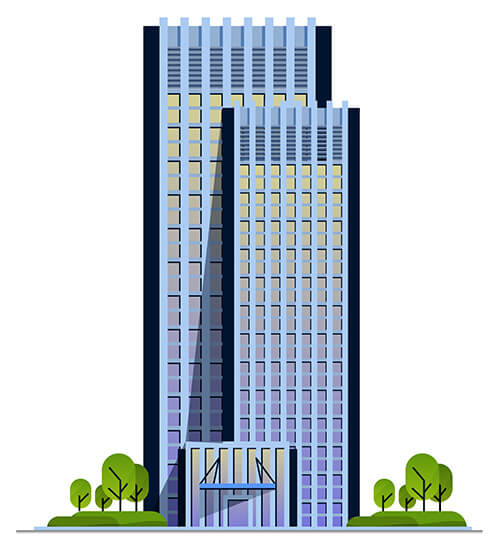
Declining Tourism
Because they are interconnected, both the foreign and local markets could be impacted by a few consecutive poor years in the tourism sector.
We know that tourism is a key driver of the Phuket real estate sector. Falling tourist numbers would therefore mean fewer buyers for many of the developments on the island. In addition, declining tourism is all that it would take to reduce local employment and salaries. If this were to happen, there would be an almost immediate impact on both local and foreign market property prices in Phuket.
Housing Affordability
As mentioned above, this is a major factor affecting the growth of the Phuket property market. If prices remain too high for too long (relative to wages) the real estate market can struggle, and one potential impact on Thai property affordability would be a shift in global interest rate policy.
We already know that low interest rates can buoy investments into tangible assets like property, and that this can also be a mixed blessing in times of a softening real estate sector. People grow accustomed to low rates, even unnaturally low ones, and a hike in rates in either Thailand or in the West could derail the housing market.
The Bank of Thailand has been hinting at a rate hike for sometime now, and it would not be unusual to see the central bank follow the lead of US Federal Reserve. At the time of writing, however, the Policy Rate has remained steady for 3½ years.
Despite the recent volatility in emerging markets Thailand has been spared any major turmoil thanks in large part to its current account surplus and sizeable foreign reserves. But if Thailand reacts to a global change in interest rate policy with rate hikes of its own, then it is possible an economic slowdown could follow.
If that were to happen, it could lead to lead to a slowdown in the local property market, not just in Phuket, but in Thailand as a whole.
Change in Government Policy
Any changes in Thai government policy directly related to the property market will inevitably have an effect on prices in the local market (either positive or negative, depending on the policy).
One such example is the proposed change in the loan-to-value ratio, which is due to come into force in April 2019. It was originally to be 1 January, but lobbying on the part of the housing industry delayed implementation.
The new rules are intended to curb property speculation, and will mostly affect second, third and subsequent mortgages. Such a tightening of mortgage lending requirements is bound to have a knock-on effect on property prices, and may even result in a greater volume of unsold properties.
Thailand’s Household Debt
The low interest rate environment has also led to an increase in Thailand’s household debt levels. Thailand currently has the 27th highest GDP in the world, with the 14th largest household debt to GDP ratio.
It is nice to see Thailand prospering, and if household debt levels stay as they are (all else being equal) there should not be too much cause for concern.
However, if there is serious expansion of personal debt, or a spike in the interest rates payable on that debt, unchecked levels of household borrowing could be a major worry for the Thai economy.
A Crackdown on Thai Companies Used to Buy Property
We have already covered this issue at length. Foreigners buy houses and villas every day using Thai companies with nominee shareholders. If the authorities at some stage decide to toughen their stance on what constitutes “illegal ownership”, it would certainly impact the real estate sector.
If nominee company structures are scrutinised at some stage, the end result could be a flood of villas and landed properties on the market, which would likely cause prices to fall. If this comes to pass, demand is likely to be softened by the negative publicity alone, which would also have a knock-on effect on prices.
The Expiration of 30-Year Leaseholds
The vast majority of people who take out a leasehold are under the impression they have bought a tangible long-term investment asset.
While most developers do their best to make sure that buyers are aware of their legal standing under a 30-year lease, many buyers believe they are being guaranteed two or three renewals (for a total of 90 or 120 years), and they believe they can sell their lease whenever they want to, as would be the case in other countries. This may be the case provided they never find themselves in court.
The first 30 years are written in indelible ink, but any further renewals/extensions are written in pencil. While it is possible, there is no automatic guarantee that either the sale or extension of a lease can be enforced, as both are dependent on clauses agreed by the original owner. To sell a leasehold, the freeholder (owner or developer) must agree to restart the lease period for any new buyer. If the freehold owner has changed, and the new owner balks at this, some unfortunate lessee will see their extension request denied. This may not be a major worry for the Phuket property market now, but at some stage in the future it could be a key driver for new buyers. Many people who purchased condominiums in the last few years opted for the cheaper leasehold condominium units rather then the freehold equivalent, mainly because they did not understand exactly what they were spending their money on.
Sam Fauma of ILO has been in Phuket since 1989, which was coincidentally 30 years ago, and he has assisted clients with Lease Extensions.
Here’s what Sam has to say:
Global Influences
Certain external events are foreseeable (or perhaps, inevitable), and can have an oversized impact on Thailand’s tourism industry, especially when you consider that their origins may not necessarily be in Thailand, or for that matter in Asia. Even a healthy economy can be affected by “contagion” during global crises and meltdowns.
Consider a global stock market crash, and the recession which would follow. It is highly unlikely to be the Thai markets which lead to any such collapse today, but Thailand would feel the effects. A drop off in global spending would mean fewer people traveling to Thailand, and fewer Phuket properties being bought.
The reaction of Central Bankers to an economic downturn is typically to lower interest rates, which could lead to a quick rebound in the property sector. But the initial downturns in tourism and property would be unavoidable.
Over Supply
In every real estate market in the world prices begin to stagnate and even fall when supply outweighs demand. In Thailand, it is important to keep a close eye on over supply, and it is a consideration which must be assessed periodically for the potential risk or reward it offers in real estate investing.
Based on the numbers of new tourists currently visiting the country, and the rapidly growing wealth of Thai nationals, it does not appear over supply will become an issue, unless a major global catalyst were to simultaneously affect both the Thai middle class and the tourist numbers.
New Phuket property owners and potential buyers should nevertheless be aware of the supply-demand dynamic within the Phuket real estate sector.
Right now, while development is extremely buoyant, buyers must understand that sellers are competing with attractively-priced new developments. Economies of scale on larger developments over the years have helped to keep prices down, so sellers may have difficulty finding a willing buyer at their desired price until development slows, and new sites come up less frequently.
With so many new developments springing up over the last few years, the resale market will potentially have a massive ‘overhang’. Buyers must have a long-term approach if they are to take advantage of the supply-demand dynamics, and over the long term they will likely be rewarded.
Negative Publicity
Bad publicity is detrimental to any industry, and the real estate sector in Thailand has not been immune to this. We have heard tell of individuals or companies engaging in either unethical or illegal activities, which is why it is so important to conduct thorough due diligence when buying a property.
Some complaints have found their way into the newspapers and online media, and have stoked negative publicity.
Examples include:

Another troubling sales tactic which has come to light is foreigners literally being told they can wind up with one or more free properties if they buy a number of units off-plan.
Some agents are encouraging foreigners to buy multiple condominiums, with the promise that the agent will, upon completion, personally broker the sale of enough units to either break even or turn a profit. The sale will allegedly leave the foreign investor with at least 1, and possibly many “free” condominiums.
We don’t necessarily want to call this practice a lie, so let us just say it is a non-contractual promise which is highly unlikely ever to be realised. In a worst case scenario, the investor owns a slew of condos, and has paid for all of them. However, if they are committing too much of their savings or their nest egg to this strategy, it could leave the investor strapped for cash should the “highly profitable sale” (on which this whole marketing scheme is based) never materialise.
Any buyer should see through this for what it is – a sales tactic designed to enrich one person (Hint: not the investor). The years ahead may see an extended period of detente, whereby the authorities do not enforce certain behaviours. Perhaps we will also see laws more favourable to prospective foreign land ownership.
But if there are further issues related to illegal ownership, dubious marketing schemes, and non-extensions of 30-year leases, the subsequent reporting will not be pleasant. And the publicity will certainly not be positive.

Incorrect Reporting On the Phuket Property Market
While some articles engendering negative publicity for the Thai and Phuket real estate sectors may have been well intended, the foreign press sometimes do not understand what they are writing about.
Occasionally a foreigner finds a journalist with a sympathetic ear, but it is obvious that the reporter has not fully comprehended the true nature of the story they are covering. Sometimes the unfortunate event being written about was nothing but a poor decision made by a foreigner – a decision that could easily have been avoided – but this does not come across in the reporting.
It is possible (even likely) the foreigner should have had enough information to make an informed and intelligent decision, and could have avoided the predicament in which they found themselves. In some cases the foreigner actually violated the law by acquiring control over landed property, but the reporter has failed to mention this.
While we sympathies with anyone who has had bad luck (none of us wants to read about someone losing their home and/or their investment), it is important to note that bad publicity in the press is not necessarily the result of disreputable activity within the industry.
Sometimes it is, but sometimes individuals make avoidable mistakes. Unfortunately, reporters do not always take the time to uncover the truth behind the tale being spun by the aggrieved foreigner.
Unbiased Reporting (Largely Ignored)
This article from The Telegraph in the UK is from 2012. It clearly spells out the law as it pertains to buying land with Thai companies and nominee shareholders. It also quotes a Thai official who talks of the need to crack down on illegal foreign ownership.
The fact that this article was written 7 years ago, and that the actions being mooted by the authorities did not happen, should not make people more confident to continue with the same practices. It should instead serve as a warning that the Thai government has been aware for years that foreign ownership structures are being established which violate the spirit of Thai law.
People should also recall that there was the small matter of a military coup and a change in government since that article was written. Addressing foreign property ownership was hardly the first priority for the new government, but don’t believe they plan to ignore it forever.
Everyone in the Thai property market is obviously in favour of a measure of restraint being shown, and of changes (or at least clarifications) being made in the law. We are eager to see what transpires.
A Change in Visa Rules
Will foreigners always be welcome in Thailand? We certainly hope so! But while foreigners have been welcome for decades, there have been periods of tightening (then relaxing) of immigration standards over the years.
This has manifested itself most noticeably in the restrictions on Visa Runs – quick day trips across the nearest boarder and back, for the purpose of “renewing” a 30-day visa on arrival. While this practice is still permitted, it is limited to two such trips over a land boarder (or six via an international airport) in a single calendar year.
We should never rule out tightening in other areas, and one visa category which could be vulnerable to a change in policy is work visas/work permits. A number of foreigners in Thailand have work permits issued by small businesses, in some cases, their own small business. Just as a closer inspection of Thai companies owning property is likely, it is possible that companies issuing work permits to foreigners could be looked into one day to ensure they are structured correctly and are actually trading and hiring Thai employees.
Thailand understandably wants the foreigners living here for the medium to long term to be using proper visas. When it comes right down to it, this is no more than any western country demands of its visitors.
Extended stay visitors or anyone using a proper visa issued by a Royal Thai Embassy will likely be just fine. Likewise, we are confident that anyone over the age of 50 who is retiring in Thailand will always be welcome.

Key Drivers for the Phuket Property Market Articles
Introduction – The Positives & Negatives of the Phuket Property Market
Introduction - The Positives & Negatives of the Phuket Property Market The vast majority of buyers in Phuket today have a positive outlook on the property market, and it is easy to see why. But even
Phuket’s Positives – Looking At The World Through Rose Coloured Spectacles
Looking at the World Through Rose-Coloured Spectacles Phuket Has a Far More Stable Real Estate Sector As discussed previously in this guide, there is little to no borrowing in the foreign property market in Phuket, which
Phuket’s Shifting Demographics
Phuket's Shifting Demographics Phuket Population Growth Even without the foreigners who have decided to make Phuket their home, Phuket is experiencing strong population growth (7.4% annually). This is much higher than most other regions of
The Hospitality Driver – How Phuket’s Tourism Industry Directly Influences The Island’s Real Estate Sector
For a small country, Thailand has a remarkable tourism industry, and anyone who has been captivated by Thai culture, Thai food and the friendliness of the people can easily see why. Maybe we are biased,
Phuket’s Ongoing Infrastructure Improvements
ONGOING Phuket Infrastructure Improvements Those expatriates who have lived on the island for a couple decades (or longer)have seen almost unimaginable changes. Anyone fortunate enough to have lived here for the last four decades has watched a sparsely populated
Which Nationality is Driving the Phuket Property Market in 2024/2025?
As we have always stated, the Phuket tourism sector provides the fuel that keeps the Phuket property market either burning hot or cooling to the point of stagnation. Or, in the worst case, absolute inertia, as seen during the
Phuket’s Negatives – Taking Off The Rose Coloured Spectacles
Taking Off the Rose Coloured Spectacles How Rising Interest Rates May Be a Negative for the Phuket Real Estate Market in 2024 Interest rates have not, historically, had the same influence on the Phuket property sector as
Thailand’s Other Vulnerabilities
Declining Tourism Because they are interconnected, both the foreign and local markets could be impacted by a few consecutive poor years in the tourism sector. We know that tourism is a key driver
The Black Swans of Tourism Summary
A “Black Swan” is a metaphor first described by Nicholas Taleb in his best-selling book Fooled by Randomness. Taleb’s premises that rare, and in some cases devastating, events occur randomly from time to time. He goes on to say
Summary of Key Driver’s Affecting Phuket’s Real Estate Market
Summary of Key Driver’s Affecting Phuket’s Real Estate Market In One Final Nutshell It should come as no surprise that there is a strong correlation between the number of tourists a country embraces each year, and the volume of
 What Sam Says About Lease Extensions
What Sam Says About Lease Extensions
Social Contact